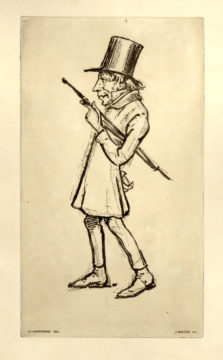by Charlie Huenemann
“Out of love for mankind, and out of despair at my embarrassing situation, seeing that I had accomplished nothing and was unable to make anything easier than it had already been made, and moved by a genuine interest in those who make everything easy, I conceived it as my task to create difficulties everywhere.” (Johannes Climacus / Søren Kierkegaard, Concluding Unscientific Postscript)

It is entirely possible that we cannot handle the ever rising tide of knowledge. Yes, I am going to presume that it is knowledge — that we are not barking up the wrong axis mundi, that we are not ten days away from the next Einstein who overturns everything, that this time next year we will not look back on today as back when we were mere children. You might ask how I can possibly make this presumption, and you are right to ask. Nevertheless…
We know a helluva lot. It’s really extraordinary if you stop to think about it. Why should the descendants of some savannah primates be able to figure out all this stuff about quarks, penicillin, double-entry bookkeeping, stock derivatives, the rise and fall of psychoanalysis, Bluetooth (well, right, work in progress), and microchip readers? Any ancient alien bookies would have placed the odds heavily against us. But here we are, trying to drink from a veritable firehouse of veritas, swelling our heads most impressively.
As I said, maybe we can’t handle it. What am I saying? Of course we cannot handle it. Look at the guy over there, the one who holds in his palm a device that can tell him that there may be archeological evidence of the Hanging Gardens of Babylon beneath the Euphrates, the one who is watching a video of a dog pooping on a boat. Check your own recently closed tabs. Would you make him or you the lord of the whole of human knowledge?
Yet many of us habitually think we are pretty much on top of things. We read the daily news digests, and we saw that video of quantum electrodynamics. Moreover, we had that professor in college (what was his name?) who told us about the medieval origins of interest rates. So we’re pretty much good to go with whatever opinion floats to the tongue.
But let us not be too hard on ourselves. We presume such competence only because, like idiots, we have established a culture that expects us to have opinions on everything, and even rewards us for unexpected and implausible ones. Those of us privileged to fall within the clicking and scrolling classes would like to have something to show for our daily efforts. We think that what we can show is what we know, or what we might plausibly claim to know, or what we can get away with claiming to know. A moment of sober philosophical self reflection will pop the bubble, and we are left wondering how exactly we have profited from what sure seemed like learning at the time. Well, it was learning; as I said, we know a lot; but the ratio between what any of us can know, and what we need to know in order to be competent in our knowledge, well, that’s like a big ratio, man, and not in our favor.
An alternative, and maybe one we can more ably manage, is to follow Herre Climacus and look instead for complications. I do not mean trolling. To troll is to raise unproductive difficulties for the vicious joy of making other people upset. That’s for losers. I’m talking about making productive difficulties for the virtuous joy of recalling ourselves and our friends to our own limitations; in short, being an epistemic spoilsport. What don’t we know? What don’t we understand? What doesn’t seem to fit? Why is it that we know more than ever, and yet, and yet?
Of course one can raise these questions as offensive maneuvers; we can play the part of skeptics to knock know-it-alls from their high and mighty thrones, or we can pretend not to understand one thing in the hopes of persuading someone to believe another thing instead. But I am recommending something more naive and genuine. Honest and reflective people might consider owning up to the fact that they really don’t understand what’s going on with this or that, and don’t have a sexy opinion to offer. And they can broadcast this expression of failing to others, who might at first seem surprised or bemused at such a flat refusal to play the trade opinions game, but after a few minutes they may recognize that good lord there is the possibility of a real conversation on offer here, and together we might express our befuddlements and share in our perplexities, and at the end of the night feel as if in our shared ignorance there is a shared humanity.
You don’t have to know everything in order to see that you understand very little, but a little bit of knowledge helps. And that’s all we are ever likely to have as individuals, even with 5G networks. This is why I am thinking we just might be able to pull this off. We can’t do full knowledge; that’s way too big. We can’t even reach a respectable level of knowledge. But a little knowledge, and some wonder, and some complications that we can meaningfully share with one another, that we can do. A little less confidence, if you please, and more honest talk. Tell me what you don’t know.
